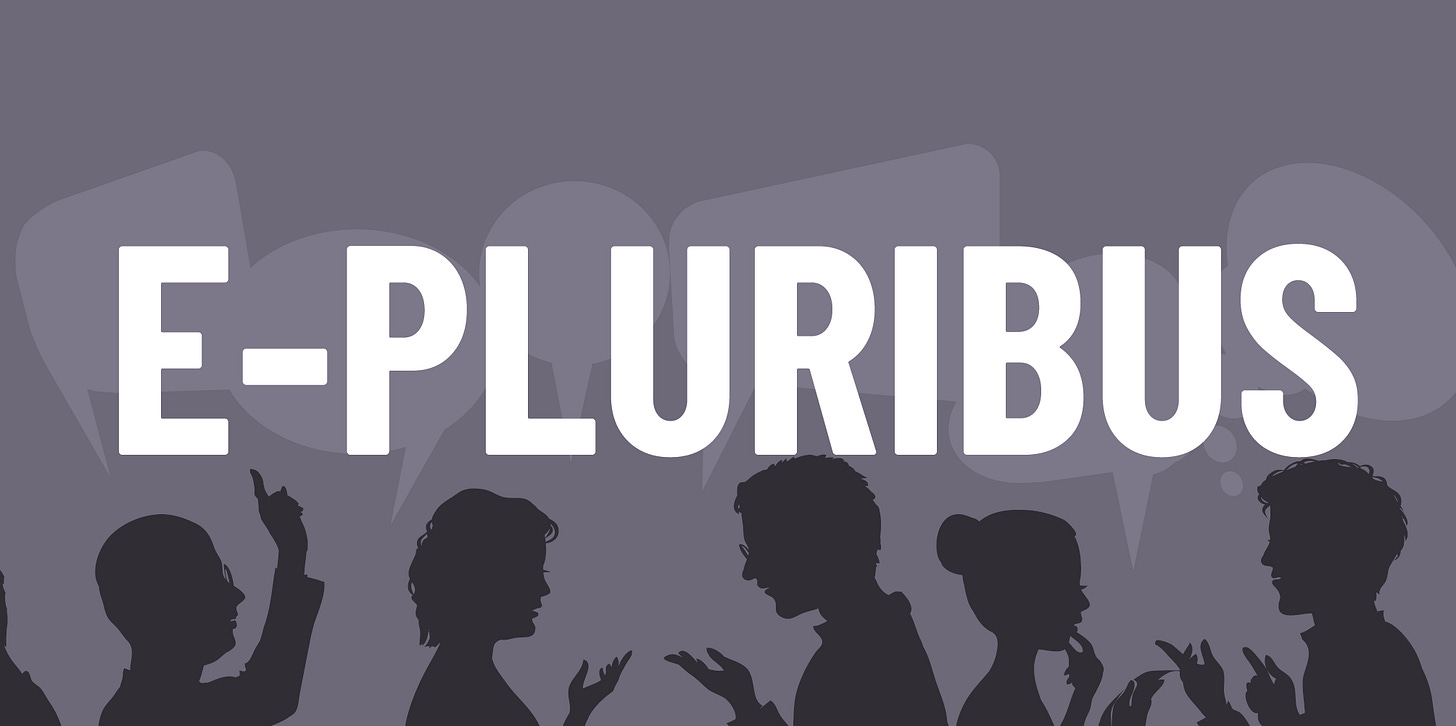E-Pluribus | May 12, 2021
An especially insidious yet strangely ubiquitous document on race, the anti-education impact of "anti-racism" instruction, and regulatory overreach for social ends.
A round up of the latest and best writing and musings on the rise of illiberalism in the public discourse:
Matthew Yglesias: Tema Okun's "White Supremacy Culture" work is bad
At Slow Boring, Matt Yglesias takes on Tema Okun's "White Supremacy Culture" head on. Though not widely touted by the progressive intelligentsia, Okun's work has managed to infiltrate on a more granular level, giving it an outsized influence despite the fact that it is, in Yglesias’s words, “really dumb.” Rather than expose “white supremacy” for the harmful ideology that it is, Okun manages to blur the line even more by attributing malevolence to unremarkable characteristics shared across racial and ethnic lines.
The craziest thing about “The Characteristics of White Supremacy Culture” is that it has literally nothing to do with race.
Some of the things she condemns are genuinely bad. For example, it is true that some people have “the belief there is one right way to do things and once people are introduced to the right way, they will see the light and adopt it.” That is in fact not true and not a productive way to live your life, conduct political work, or run an organization of any size.
Mostly, though, she’s against things like “either/or thinking” and “perfectionism” where it’s pretty clearly a case in which you just don’t want to take things too far. I am the very opposite of a perfectionist, and in my old blogging days, I was infamous for my typos. Today I am still like that, but thanks to the help of Marc and Claire, I try to keep dumb mistakes out of Slow Boring since this is, after all, my job, and thousands of subscribers have kindly agreed to pay for it. But I still frequently find myself encountering people who are too perfectionist-oriented, and there are absolutely people who are too hung up on dichotomous thinking and false binaries. But there are also people who are too sloppy or too indecisive.
But big picture, none of this has anything to do with race or white supremacy!
Read it all here.
Frederick M. Hess and J. Grant Addison: How Anti-Racism Is Derailing Efforts to Improve Education
The education system in America has few diehard fans. Criticism comes from all ideological and political quarters: the right sees a lack of rigor in standards and a focus on ephemera and social concerns over imparting knowledge, and the left sees oppressive, segregated institutions that simply reinforce centuries of an unfair, stratified society. Despite many real problems in education, Frederick M. Hess and J. Grant Addison write that the recent obsession with an “anti-racist” curriculum will do nothing to address what really ails the system and more likely will make things worse.
The anti-racist agenda is sprawling, encompassing subjects as seemingly far afield as math. California’s Department of Education has proposed an “anti-racist math framework” intended to rectify the “problem” of Asian Americans filling an outsized share of seats in gifted programs. The framework would “ban grouping students by ability or merit, all but eliminating algebra for middle schoolers and a crucial two years of calculus for high schoolers.” The Oregon Department of Education has urged teachers to be trained on “ethnomathematics” in order to purge “white supremacy” from math curricula (purportedly racist practices include requiring students to “show their work” or putting an emphasis on “getting the ‘right answer’”).
Anti-racist education has become a racialized justification for all manner of bad, long-discredited ideas. Like hippie educators of the early ’70s, anti-racists want to end grading as conventionally understood. One prominent “grading equity advocate” is Cornelius Minor. Minor has partnered with entities like Columbia Teachers College and the International Literacy Association to dismantle “pernicious” grading practices, such as requiring students to demonstrate subject-matter understanding in order to receive an A. Minor teaches that one “cannot separate grading practices” from “the history of classism, sexism, racism, and ableism in the United States.” A teacher’s inability to perceive a student’s knowledge, under this framing, is more typically evidence of a teacher’s racism than a student’s lack of knowledge.[…]
Anti-racist education today has little to do with forging coalitions to tackle these challenges, confront obvious instances of racism, or help teach students to engage thoughtfully and open-mindedly on issues of race. Rather, the anti-racist educational project turns out to be a strange, sophomoric assault on civilization itself. After all, it’s hardly the case that “white” culture is uniquely math-obsessed or analytic. Around the globe, air traffic controllers who supervise flying steel, surgeons who handle human hearts, or architects whose bridges resist gravity’s pull tend to value precision, objectivity, and rationality. This is true in Alabama and Angola, without regard to race, nationality, or cultural background.
Read the whole thing at The Dispatch.
Richard Morrison: When ‘Voluntary’ Becomes Obligatory — Regulatory Creep and the SEC
Debates over the social responsibilities of corporations are almost as old as corporations themselves. While the government has a role to play in establishing and policing the framework in which corporations function in society, Richard Morrison writes that sometimes federal agencies (the Securities and Exchange Commission in this case) overstep their bounds and attempt to coerce behaviour clearly beyond their purview.
For years, proponents of corporate-social-responsibility frameworks, including the growing ESG movement, insisted that their recommendations were no threat to the market economy because they were voluntary, and many were presided over by successful businesspeople themselves.
But that window of voluntary initiative appears to be closing. Last September, Commissioner Lee wrote in the New York Times that properly informing the public about climate risks “can happen only through mandatory public disclosure.” Michael Jantzi, CEO of leading ESG-ratings firm Sustainalytics, announced that he had changed his own mind last year, telling the Financial Times, “I was not a fan of mandatory disclosure. But now I have shifted. We have passed the time of voluntary disclosure mechanisms.” The SEC’s own Investor Advisory Committee also issued recommendations last year calling on the agency to require specific disclosures on ESG topics.[…]
Some advocates suggest ESG guidelines are just common sense or that, even if they are complicated, it will just require getting a team of experts in a room together to figure out the details. But that is a dangerously false assumption. Deciding how a privately owned corporation should be made to approach issues of this kind raises fundamental questions over the nature of private property. Beyond that, handling these issues will inevitably involve difficult trade-offs. No well-intentioned geek squad can solve these problems for us and nor should they be given the power to do so.
Read it all here.
Around Twitter
An excerpt from Heterodox Academy’s series On Diversity in Education:
The government in Hong Kong continues its moves against freedom:
A thread on an essay by a high school senior in Brooklyn who takes issue with the box the education system has tried to put him in.
Speaks for itself:











